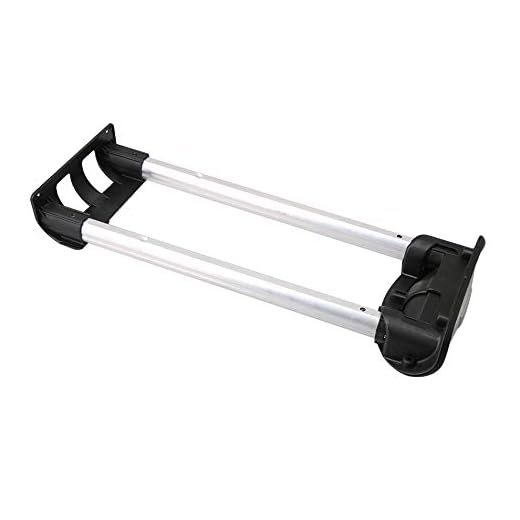


Begin by assessing the degree of distortion. Gently try to realign the arm in its original position using your hands. If it proves difficult, consider applying controlled pressure with a sturdy tool, such as pliers, while also placing a cloth over the arm to prevent scratches.
If manual adjustment doesn’t yield successful results, disassembling the attachment point can offer a better angle for correction. Look for screws or fasteners that hold the arm in place. Loosen these carefully and straighten the component using the same method as before.
Once the shape is corrected, reattach the arm to ensure it’s secure. Tighten screws adequately to maintain stability. Finally, conduct a functionality test to confirm that movement is smooth and unobstructed. A layer of lubricant on the joints can enhance ease of use and longevity.
Repairing a Deformed Suitcase Grip
For immediate restoration, utilize a heat source such as a hairdryer to soften the material. Gently manipulate the grip back to its original shape while it’s warm. Transition to a cooler environment to solidify the adjustment.
Consider the following steps for a lasting remedy:
- Examine the connection points for any visible damage, ensuring screws or rivets are tightly secured.
- If the attachment is loose, apply epoxy glue specifically designed for plastics and metals for enhanced durability.
- In case of severe warping, using a pipe wrench covered with cloth can assist in reshaping without causing further dents.
Protection from future alterations is crucial. Employ a sturdy sleeve or wrap when not in use to prevent impact damage during storage or travel.
Regular maintenance checks can preempt further issues; inspect for loosened screws and environmental wear.
Assessing the Damage to Your Luggage Handle
Begin with a detailed inspection of the shape and structure. Check for any visible cracks or fractures around the attachment points. Use a flashlight to examine hard-to-see areas where stress might have caused hidden damage.
Identify the Severity
Determine whether the misalignment affects the mechanism of elevation or if it remains functional. A slight bend may only require gentle manipulation, while a more severe distortion could compromise structural integrity, necessitating parts replacement.
Material Considerations
The composition plays a pivotal role in how you approach the repair. Metal handles may be reshaped with tools, whereas plastic types might require heat for adjustments or adhesives for reinforcement. If uncertainty persists, consult a repair service to assess whether a suitable replacement option exists.
For those interested in other forms of transportation equipment, check out are drones considered aircraft.
Tools You Need for Straightening the Handle
Before beginning repairs, gather a few essential tools. A heat gun or hairdryer can help soften materials for easier manipulation. Pliers are useful for adjusting metal parts without causing damage. A rubber mallet provides a gentle way to reshape components without marring the surface. A sturdy work surface ensures stability during the process, while protective gloves can prevent injuries during handling. Finally, a measuring tool helps confirm that the adjustments restore proper alignment.
Step-by-Step Guide to Straighten a Bent Handle
First, place the cart securely on a flat surface to prevent any movement during the process. Use a soft cloth to avoid scratching the surface while working on the rod.
Assess the Degree of the Deformation
Examine the component carefully to determine how much it has warped. If it’s a slight curve, you might be able to adjust it by hand. For more significant distortions, greater force may be required.
Applying Force and Straightening
For minor curves, try gently pulling or pushing the segment in the opposite direction of the bend until it aligns straight. For more substantial curves, use pliers or a wrench softly on both sides, ensuring a gradual adjustment to avoid cracking. If the material is sturdy, a heat source such as a hair dryer might help to make it more malleable before adjusting. Be cautious with excessive heat to prevent damaging the plastic or metal.
Once you’ve achieved a corrected position, allow it to cool in place if heat was used, or simply check for stability in its new form. Ensure it operates smoothly before using it again.
If you’re considering other travel gear, check out the best portable sports umbrella or the best double umbrella stroller for tall toddler for more reliable options during your trips.
When to Replace Your Luggage Handle Instead of Repairing
If a traveler’s grip support is excessively damaged, opting for a replacement is advisable. Consider switching out this component when:
Signs of Severe Damage
Look for these indicators that might suggest a replacement is necessary:
| Indicator | Description |
|---|---|
| Cracks or Breaks | Visible fractures that compromise structural integrity. |
| Severe Misalignment | Significant deviation from the original shape that cannot be corrected. |
| Worn Attachments | Uncertain connections or interfaces with the main body of the travel case. |
| Difficulty in Function | Issues in retracting or extending the grip without excessive force. |
Cost Considerations
When the expense of a new grip mechanism approaches the repair cost, replacement is often more sensible. Assess the overall durability and longevity of the new part versus the current one. If repairs consume excessive time or effort, modernization can result in a significantly improved experience during travels.
Preventive Measures to Avoid Future Damage
Store your bag upright in a designated space, minimizing pressure on the telescopic extension. Ensure that heavy items are packed at the bottom to maintain balance during transit.
- Use protective covers or soft bags to shield from potential impacts.
- Avoid overloading; excess weight can easily lead to warping.
- Regularly inspect for loose parts and address any issues immediately before they escalate.
- Utilize luggage racks when storing in hotel rooms to prevent unnecessary stress on the components.
- Be cautious in crowded areas. Maneuver with care to avoid collisions.
Consider investing in a hard-shell variant if frequent travel is anticipated, as they typically offer better durability against rough handling.
- Choose lightweight materials that enhance portability without compromising strength.
- Familiarize yourself with guidelines provided by airlines to avoid mishaps during check-in.
Regular maintenance checks ensure longevity; clean and lubricate moving parts periodically.







